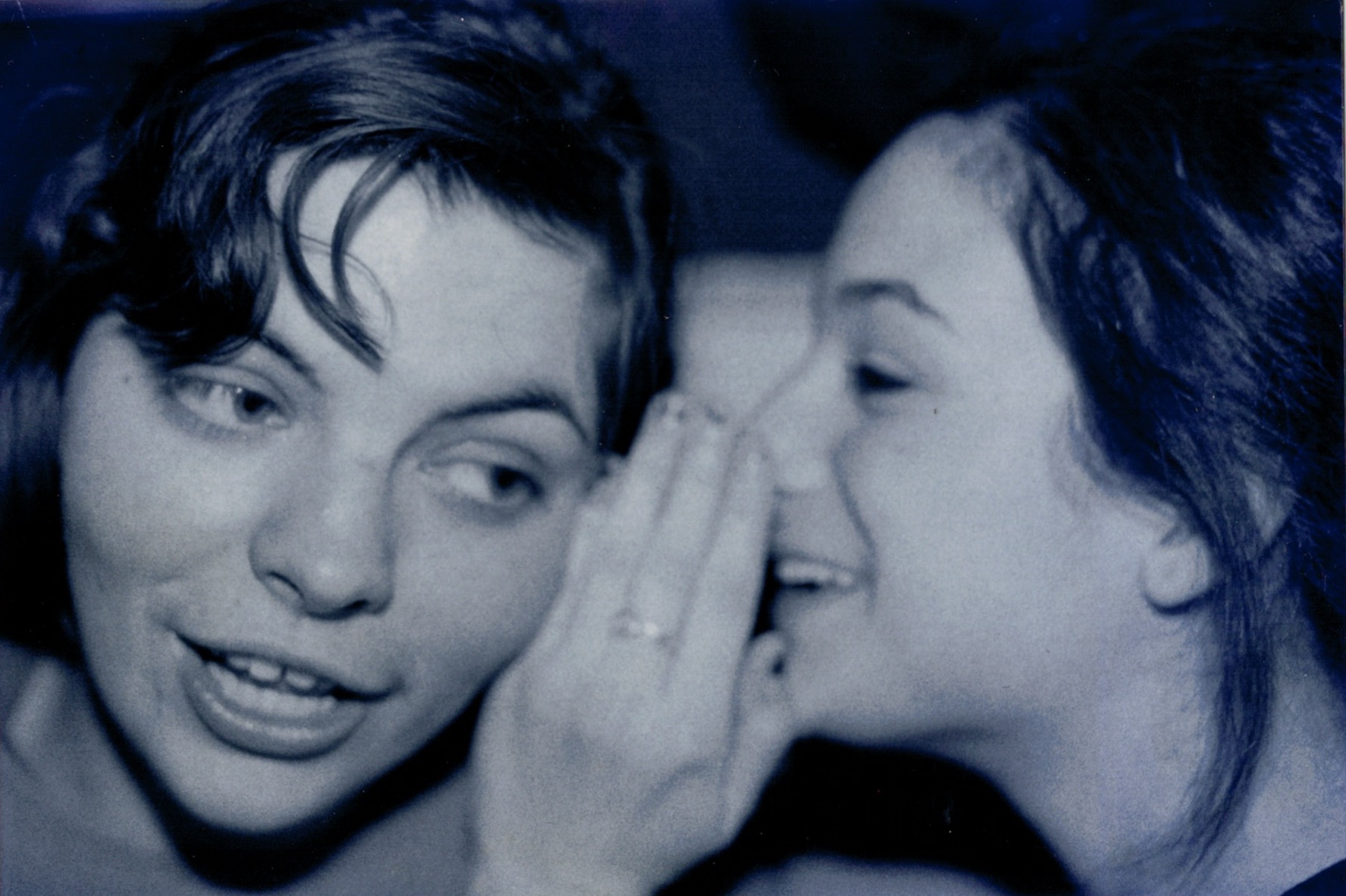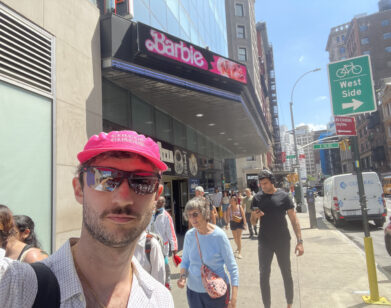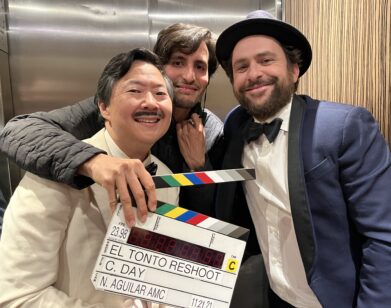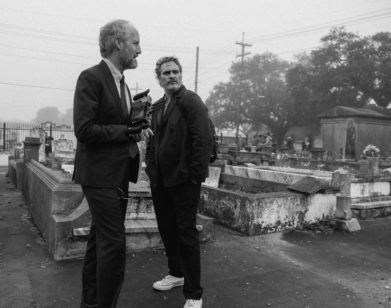Jenny Slate and Nellie Killian on letting women tell their own stories

IMAGE COURTESY OF NELLIE KILLIAN.
The dearth of female filmmakers that have any name recognition whatsoever is overwhelming. How do you give recognition to women’s stories if you can’t think of who the hell authored them? If you don’t validate their work when it’s exceptional?
Film programmer Nellie Killian has been working to change that, and with a new series at Metrograph starting February 2—Tell Me: Women Filmmakers, Women’s Stories—Killian will highlight those stories, created by women about women.
Filmmakers like Chantal Akerman, Vivienne Dick, Chick Strand, Yvonne Rainer, Agnes Varda and Michelle Citron have already let vulnerable women, strong women, intelligent women, and fierce women speak for themselves. We just have to watch.
Giving women the space to tackle dynamic narratives is also an issue close at heart for actor and comedian Jenny Slate, who spent her college years as Killian’s roomie. Slate, who acted in “that abortion comedy” Obvious Child [2014], has faced her own challenges as a female in a male-dominated industry, especially one brave enough to tell a story that no man would likely consider. For Slate and Killian, there is no better time—in our current climate, especially—to allow women to share their stories.
SLATE: I’m sitting right now in my childhood bedroom and my mother is on the phone in the other room talking about shower curtains, and I’m about to have a conversation with you, my college roommate and my friend since the year Y2K. I mean, this is a broad question, but why did you want to put [Tell Me: Women Filmmakers, Women’s Stories] together now?
KILLIAN: Three or four years ago there was a restoration of Chick Strand’s Soft Fiction [1979], which is the movie that’s opening the series. I had seen it before and it was this beautiful new print of the movie. Often when a movie is restored, it gets a re-release or it shows on [Turner Classic Movies]. But when you have a 54-minute experimental feminist film, it’s not gonna get out into the world in the same way. I thought it’d be great to do something with this movie.
I was like, [the series] could just be something about women talking to each other. And then this fall, reading all these accounts of women talking about trauma, especially those articles in the New Yorker—just one after another—it was horrifying to read. I remembered when I saw Soft Fiction and thought these women telling these really intimate stories on camera—for other women to feel they’re not alone in experiences that they have—is such an incredible gesture.
The time is now to listen to these women’s stories and as I was putting it together I realized that that refrain of “listen to women”—people kept on saying it like it was a burden to bear. Like, “You have to listen to women, even though it’s a bummer,” and I was like, “It’s not a bummer to listen to women!” [laughs]
SLATE: Right! [laughs]
KILLIAN: Listen to women when they tell stories—they tell all sorts of stories. If you don’t listen to a woman when she wants to tell you what she did last weekend, and she’s dismissed, there’s no way she’s going to feel comfortable talking to you about a trauma that she’s experienced.
SLATE: Yeah. It’s delightful to watch all of these films because what you’re getting is intimacy and what you’re feeling is empathy. Which, as a devotee of [writer] Rebecca Solnit, when I read The Mother of All Questions [2017], she defined empathy as to put yourself inside someone else or let someone else be inside of you. That’s an equal back and forth.
In general, empathy is discouraged and it’s not a tool that’s developed and we all suffer when we can’t have that. Especially in The Woman’s Film [1971], they are working so naturally towards it.
KILLIAN: That movie is such a hopeful movie. It starts with [the women] having these conversations. A lot of them started with them in these consciousness-raising groups in San Francisco and around the country and I feel like no one uses that phrase anymore, “consciousness-raising.”
SLATE: Yeah.
KILLIAN: And it’s so much more useful than this binary of you’re either woke or you’re not.
SLATE: Yes! I was watching it and thinking, why has anybody been convinced that, like you said, you’re either woke or you’re not, and that some of these things are mundane like taking care of your kids or cleaning your house? That they’re pedestrian or that they are 100 percent oppressive?
The fact is that we are all human, we like to feather our nests. There’s nothing gross or off-the-bat degrading or demeaning about it, but it is our system that has designated what our jobs are and what our tasks are and the gender roles within that are very hard and oppressive.
I was watching these women and they’re putting their children in the center of the circle, sitting in their houses, talking about what they need to do so that they can thrive. I was thinking about my generation, our generation, and that there’s a lot of, “Well, I read this thing online…” Like, I read a three paragraph thing on [American-German philosopher] Hannah Arendt so I get it. You know? [laughs]
KILLIAN: [laughs] Yeah, it’s attractive to think that you can just learn the rules and live by them.
SLATE: Right.
KILLIAN: But what these women are doing is imagining a better world with different rules, and that’s the real thing. Not just being told no, but finding new things to pursue.
SLATE: And in Janie’s Janie [1971], too, she’s working towards it and it comes for her naturally but one thing I was saying was I found myself being surprised that I have been convinced.
I have somehow been subconsciously convinced that being listened to is a privilege, a sort of male privilege, but that if you want to be listened to, you better be perfect at what you are going to say. That really connects to when I hear you say, like, “Why did I have to have a finer point on this?” It’s so rich. Why does it have to be so clear? Why can’t it just be rich and human?
Even when we made Obvious Child [2014], that film about a woman having an abortion, I remember learning like, “Wow, we don’t have to have a giant statement about abortion, we have to show a richness of experience.” I’m watching these movies and I feel that these women came so far so quickly, and then there was a strange stagnation. Like, that was work. Can we all lean back and relax for a second?
KILLIAN: It’s hard work when you’re looking at The Woman’s Film. It felt to me like there was a narrative as all of this was happening—finally we’re in a moment where women feel comfortable to say these things. And I was like, they’ve been saying them! It’s not that people weren’t saying it, it’s that people weren’t listening and there was no platform for it.
SLATE: Right, like in Janie’s Janie, she speaks about the woman being interviewed, she speaks about how she’s been not just discouraged from finding out things that she needs to know in order to just function as an empowered civilian, but that her society has willfully turned her away from it and has distracted her and hid things from her.
I even think that’s a conversation that started happening after the movie Bridesmaids [2011] came out that was like, “Are women funny?” For the female comedians who grew up on Lucille Ball and Lily Tomlin and Carol Burnett and Gilda Radner, we’ve never asked that question. You’re asking that because you’re a man and you’re wondering if you should take us in. You’re wondering if it’s worth it.
I was watching one of my favorite ones, Clotheslines [1982]. Part of that is personal for me—one of the women in The Woman’s Film talks about this split within her where she’s like, “I’m very privileged, I have this cushy job, but there’s another side of me that’s like, ‘I’m being used! I’m being used and I’m really just holding up a man.’”
KILLIAN: She has to look cute for her boss’ clients when they come in and all this other bullshit but she feels lucky that she has the job.
SLATE: There’s so much pressure to live with that dissonance and there’s so much pain to have your potential inside of yourself and not be able to let that get out there and really shine. To just watch these dudes around you have the total freedom to have that happen.
KILLIAN: And watch your work just go towards their glory.
SLATE: Yeah, you know what I’ve always been interested in is like, “Oh, I don’t want to be like that. I don’t want to be kept down.” But I like to feather a nest. I like to have comfort, I like my house to be clean.
KILLIAN: One of the crazy things with Clotheslines is a lot of these women obviously don’t have a washer and dryer or anything. The amount of work that went into keeping the clothes clean is so evident in that movie and the way that their husbands don’t see it as work or time [spent]. These women are being like, “I’m spending four hours a day doing laundry!” And it’s invisible to everyone for whom they are doing the laundry.
SLATE: I really think Clotheslines was my favorite. It really revealed something about the pressure of the community but also the isolation of the women and their strengths. At the end of the film there’s a woman who talks about how her mother had premonitions. She would have these dreams about the laundry, and at the very end of the film there’s a brief moment where you have access to a more spiritual look at what this, doing the laundry, can be.
KILLIAN: One thing that these movies get at is that it’s an impoverished perspective not to be able to relate to other people. It’s an impoverished way to live. Because it’s hard to make the imaginative leap to have empathy for another person, they just view it as a burden or something but it’s not; it’s better.
SLATE: Yeah.
KILLIAN: If you can just get there, it’s better.
TELL ME: WOMEN FILMMAKERS, WOMEN’S STORIES WILL SCREEN AT NEW YORK’S METROGRAPH FROM FEBRUARY 2, 2018.






